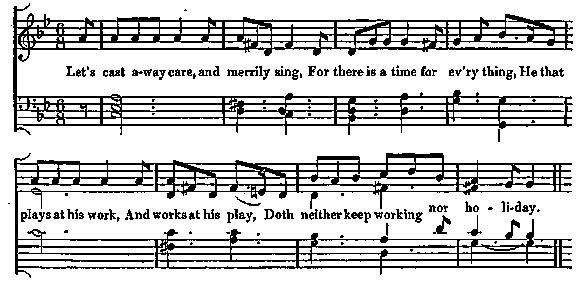Popular Music Of The Olden Time Vol 1
Ancient Songs, Ballads, & Dance Tunes, Sheet Music & Lyrics - online book
| Share page | Visit Us On FB |
|
|
||
|
REIGN OF ELIZABETH. 161 |
||
|
|
||
|
Wynken de Worde printed a tract called Cocke LorreWs Bole; in which persons of all classes, and, among them the Mynstrelles, are summoned to go on board his Ship of Fools. Cock LoreWs Boat is mentioned in a MS. poem in the Bodleian Library, called Doctour Double Ale, and in John Heywood's Epigrams upon 300 Proverbs, 1566 (in the Epigram upon a Busy-body, No. 189).
In S. Rowland's Martin Markhall, his defence and answer to the Bellman of London, 1610, is a list of rogues by profession, in which Cock Lorrel stands second. He is thus described: " After him succeeded, by the general council, one Cock Lorrell, the most notorious knave that ever lived. . By trade he was a tinker, often carrying a pan and hammer for shew; but when he came to a good booty, he would cast his profession in a ditch, and play the padder." In 1565, a book was printed called The Fraternitye of Vacabondes; whereunto also is adjoyned the twenty-five orders of knaves: confirmed for ever by Cocke Lorell.
In Satirical Poems by Lord Rochester (Harl. MSS., 6913) there is a ballad to the tune of An old man is a bed full of bones, but the air is far more generally referred to by the name of Cock Lorrel.
In the " Collection of Loyal Songs written against the Rump Parliament" there are many to this air, such as "The Rump roughly but righteously handled;" "The City's Feast to the Lord Protector;" " St. George for England" (commencing, "The Westminster Rump hath been little at ease"); &c, &c. Others in the King's Pamphlets, Brit. Mus.; in the Collection of 180 Loyal Songs, 1685; in Poems on Affairs of State, vol. i., 1703; and in the Roxburghe Collection of Ballads.
A tune called The Painter is sometimes mentioned, and it appears to be another name for this air, because the ballad of " The Painter's Pastime: or a woman denned after a new fashion," &c, was to be sung to the tune of Cook Laurel. A black-letter copy is in the Douce Collection (printed by P. Brooksby, at the Golden Ball, &c).
Some copies of the tune are in a major, others in a minor key. The four lines here printed to it are from an Antidote to Melancholy, 1651, for, although some of the ballads above quoted are witty, they would not be admissible in the present day. |
||
|
|
||
 |
||
|
|
||